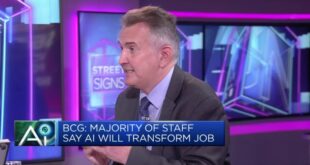NBC | NBCUniversal | Getty Images
The modern notion of a happy workplace is usually littered with foosball tables, futuristic napping pods, and lunch-break puppies. However, the key to a happier workplace might be much simpler than this — just pay employees more.
The latest CNBC/SurveyMonkey Workplace Happiness Index shows higher-income earners across the board are more satisfied with their jobs, find more meaning in their work and are less likely to consider quitting than those in lower income brackets. While all age groups surveyed say “feeling that your work is meaningful” is the most important component of workplace happiness, sweetening the pot with a higher paycheck still goes a long way in keeping employee morale high.
Andrew Challenger, vice presdent at Challenger, Gray & Christmas, the oldest staffing firm in the U.S., said workers often answer the question about work satisfaction by weighing whether or not the value they contribute to the workforce is reflected in the size of the paycheck they receive.
“It tends to be whether you feel that you’re being paid a fair market value,” Challenger said. “So if you have two master’s degrees and you’re a programmer and you have a really high value in the [labor] market and you’re being paid $100,000 when you think you should be paid $120,000, you’re not going to be particularly satisfied.”
The biggest survey disparity related to pay is in overall job satisfaction. Sixty-eight percent of workers making more than $150,000 per year reported being “very satisfied” with their current job, while only 40% of people making under $50,000 per year said the same. Both intermediate-income groups followed the same trend.
The CNBC/SurveyMonkey Workplace Happiness Index was conducted from June 21–30, 2019, among a national sample of 7,940 workers in the U.S., with a margin of error +/-1.5 percentage points.
About a quarter of Americans do not consider themselves well paid for their work, according to the survey, revealing that employers may still have some work to do in balancing this equation.
Jake Grabowski, an assistant brand manager at Procter & Gamble, views the relationship between income and workplace happiness as being more complex. Grabowski spends his workweek helping grow well-known brands like Ivory, Olay and soon Old Spice. He admits making more money affects his happiness outside of work, giving him the flexibility to visit friends out of state and buy better food. However, at the office, he cares more about feeling valued than simply getting a bigger paycheck.
“I feel happier at work knowing I’m valued, and getting a raise is a great way to show that, but it has less to do with my actual income,” Grabowski said in an email.
Grabowski says a strong work/life balance and feeling challenged at work consistently have far more influence on his happiness than salary alone.
I think that’s an interesting thing that your total income level gives you some sense of how valuable society rates your contribution.
Andrew Challenger
v.p. at Challenger, Gray & Christmas
The survey data shows that navigating the trade-off between meaning and pay is important for employers, and it is manageable. As income increased, survey results showed modest yet consistent increases in the likelihood workers find their work very meaningful, with 60% of the lowest income bracket and 69% of the highest income bracket reporting this. Challenger said this may be because employees often interpret making more money as a sign that society appreciates their work more.
“You feel valued in the world,” Challenger said. “I think a teacher that gets paid a higher salary will have that innate sense of the work they do matters because it’s valued by society by getting a higher paycheck. I think that’s an interesting thing that your total income level gives you some sense of how valuable society rates your contribution.”
Finding long-term happiness at work
Pawel Jakubowicz, a department head at a Chicago-area Dick’s Sporting Goods, agreed that receiving a bump in his paycheck did usually lead him to be a happier, more engaged employee.
“Overall, I was more satisfied with the increases,” Jakubowicz said. “It created more motivation for me to come into work, which in turn helped [me] provide a better environment in the stores.”
Jakubowicz has been promoted three times within the company and said each new role he has taken on inspired him to set new goals for himself as an employee. However, he said that while getting a raise often made his work feel more meaningful in the short term, this feeling rarely lasted long when not paired with added responsibility in the store.
“It wasn’t even because of the pay but because it lacked new learning and challenges,” Jakubowicz said. “When I got promoted, [the happy feeling] lasted longer because new responsibility and new opportunities presented themselves. … Once it became too easy or too routine, the pay wasn’t as much on my mind anymore.”
Employees in the lowest income bracket also were 13% more likely than those in the highest income group to consider quitting, which is unsurprising given that lower-paid employees are statistically less satisfied with their job.
Jon Cohen, chief research officer at SurveyMonkey, said this may have more to do with the greater number of openings available at lower pay grades than it does with actual job satisfaction. With unemployment hovering at just under 4%, Cohen said there is more pressure on employees to quit their current position knowing they will have other employment options.
“At lower income levels, there’s a lot more opportunities,” Challenger said. “When you’re at the VP level in a certain industry, there’s a lot fewer positions that are paying that much at other organizations out there. So maybe that position is a little bit more coveted. You feel like you want to hang on to it because there aren’t that many other opportunities out there that will pay the same amount.”
Wherever the line is drawn, though, the conclusion is the same: Finding meaningful work may statistically be the most important factor contributing to workplace happiness, but adding a few extras zeroes to the end of a paycheck certainly doesn’t hurt.
 EU News Digest Latest News & Updates
EU News Digest Latest News & Updates



